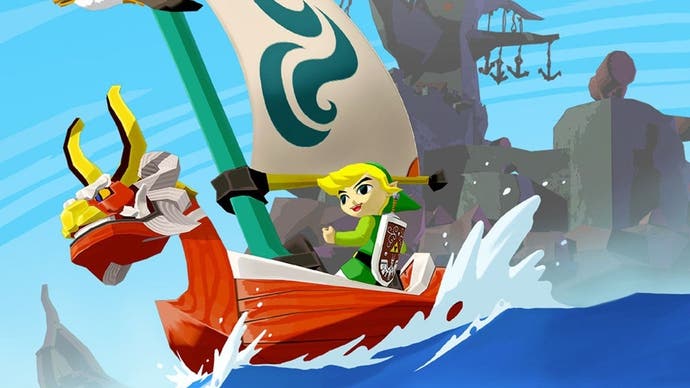The day of landing: why video games and islands belong together
Shore thing.
Is there a more beautiful word than island? Actually, switch to Latin and it's even better: insula. It's hard not to get reflective about a word like that, hard not to even get a little moony. Join me for a sweet second or two! Islands, a kind of cherished space out in the world that offers something that can only truly be internalised. A place found on the mind as well as the map.
Islands are special. For the invading Romans, the island I live on, the island I'm so familiar with that I barely even notice it anymore, once marked the ragged, terrifying edge of the known world. Elsewhere, Sancho Panza's offered an island in Don Quixote as a reward for putting up with, well, Don Quixote. Crucially, like so much else in the book, whose major theme is perceptions and misperceptions, I think I remember that the promised island's never actually real. It doesn't have to be. Perception or misperception, it's a glittering idea, a thing forever glimpsed on the horizon.
Located somewhere between the real and the entirely imaginary are video game islands. These are places I've passed a lot of time in over the years. And they're places I've been thinking about since, earlier this year, I spent a few weeks on an island in the Aegean. It turns out that life on an island - I mean a small island; I appreciate, again, that I lived on an island already - can work a kind of magic on a person. I feel more connected to the place I'm in on an island, while I'm simultaneously more aware of all the other potential places where I could be nearby. It's made me think about how games use islands and why I love games that focus on islands so much. Let's dig in.
GTA 5 is an island, and this always surprises me when we pull out to the map - no connection to the mainland at all. What's going on here? A comment on California's ultimate manifest destiny, existing on a different plate to the rest of the US and slowly being calved off? Or, more simply, a neat employment of one of the great video game uses of the sea, as a barrier separating what you can access and what you can't? Probably the latter, but who can tell.
This sea as barrier is part of the fun in a lot of games set on a single island, or set on a few closely grouped islands. Animal Crossing, A Short Hike, even the classic Halo level The Silent Cartographer? The sea is employed here a little like the guard rails in a game of bumper cars: it pushes you back and redirects you to the place where the action is. Games set on single islands often feature an extended moment of perimeter chasing - I remember working my way around the beaches of The Silent Cartographer, which gives you a whole desert island to knock about on, a conceit that still feels like magic. The boundary here, the shoreline, was a display of limitations that somehow felt like freedom. The same holds for A Short Hike, where I often do a little jaunt around the edge of the (main) island just to remind myself of how much lurks inside that border, how much fun awaits in the interior.
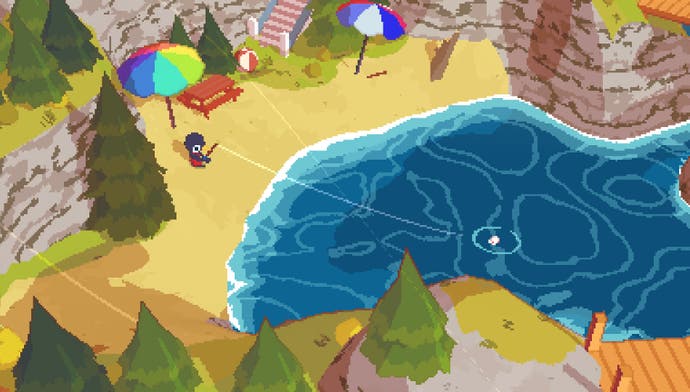
That's islands in the isolated sense. But what about genuine video game archipelagos and island chains? Archipelagos do something very specific to the imagination, I think. They give you an Odyssey to go along with your Iliad. Stories become mobile, their eyes drawn to the horizon. Like this month's glorious Saltsea Chronicles, stories become concerned with transitions and impermanence, their narratives scattered across different cultures.
(Saltsea's deeply concerned with climate change, which, as this summer so cruelly underlined, islands can be tragically vulnerable to. The game also touches on the subject of the impact of tourism - itself a contributor to climate change - and this, on a personal level, left me with a lot to think about after my stay in the Aegean.)
Quick changes! You don't always need actual islands for this. A planet can be a kind of island. A discrete level is a kind of island. So Archipelago Games, if you wanted to cobble that blessed genre together, would include stuff like MirrorMoon EP and Starfield, with its planet hopping, and would also have room for something like Super Mario 3D World, which we'll get back to in a bit. Yes, all great, but what about when games stick to actual archipelagos?
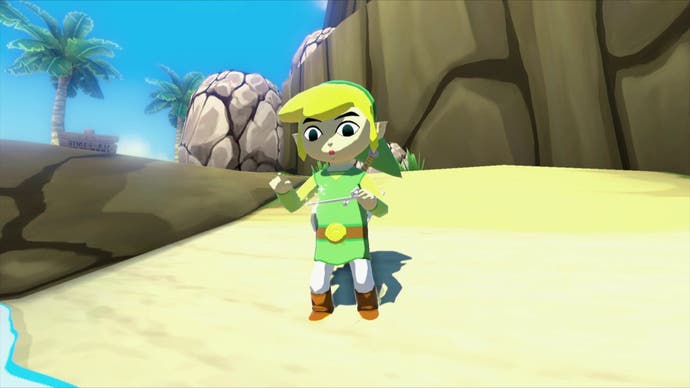
Here's what I noticed living and working in an island chain for the best part of a month earlier this year. Island life is a constant reminder that you could leave and go elsewhere, a reminder that life is going on elsewhere around you all the time, that the world is made of elsewheres. And that's because you can see these elsewheres. When I looked at the horizon on the island, from every place I could see the hazy promise of someplace else. It lights fires around the imagination. Rebecca Solnit, writing of the colour blue, says that blue is"the color of there seen from here, the color of where you are not." And there's that sense of possibility as well as melancholy to this, I think. That sense of what Philip Pullman calls "phase space", or the space of a story's potential. On an island, this phase space is enormous, and enormously varied.
Because of this, on an island I'm constantly drawn to thoughts of detail and scale. Maybe this is just the thrill of being somewhere new and unusual to me, but I'll see a strata of rock erupting from a roadside corner and in my mind I whisk off into the atmosphere, pulling away from the road until I can imagine glimpsing the entire island, patterns repeated and echoed.
Those patterns! Repeated, tidal moments of experience and adventure and expectation in a story. Islands give you this. Rituals emerging from the realities of the landscape. Maybe this is why I love games set on archipelagos so much? A game world made up of islands is a game world of endless new beginnings, of starting afresh with each wade up the beach. It's also a game world rich with potential connections between its various spaces. It has a stronger sense of being here and not there, heading there and then no longer being here as a result. Saltsea in particular understands this.
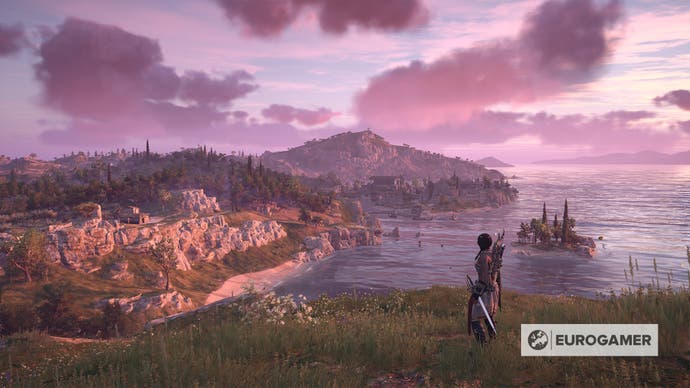
And you can also see this in something like Assassin's Creed Odyssey, one of the best archipelago games out there. The sea in this game works like a powers-of-10 shot in cinema. You reach the ocean and you suddenly understand the relative tinyness of what you've experienced so far. And along with its tinyness, you can still remember how vast it felt, running over those hills and exploring those streets and caves. But suddenly the horizon is filled with these islands with their own hills and caves and cities, what Pynchon would call their own "fine chances for permanence". Ubisoft games are often criticised for having too much stuff in them, but in a game like Odyssey the developers found the perfect template for laying out a world of too much stuff and making it feel organic, necessary. Why shouldn't this place be vast? Greece is a country but also a dizzying collection of islands. It's endlessly changing, endlessly repeating, reworking, reinventing, re-evaluating itself.
Wind Waker's another game where the archipelago really suits it, and not just because the game dares to have the thumbprint-of-the-gods conceit of giving each square of the map its own island, a promise to the player of order in amidst the ruggedness of nature. Wind Waker's islands come across as a bunch of puzzle-boxes. Even the ones that don't hold dungeons are studies in specifics and differentiation.
Context: after living for a month in the Aegean, I can tell you that I was living on the island of mopeds and crepes and beaches you can reach by boat. Living on an island is a lesson in that island's own details and schema, from the jaunty Casio jingle the ferry plays as it arrives in port to the little shimmering crystals that become visible in the paving slabs as the sun sets, paving slabs that are themselves built from stone that shows the wave and roar and halted ridges of ancient seas.
On my island in the Aegean, people cover the dashboard of their cars when they park them because of the heat. They have their own cheeses and sausage, and a kind of parsley salad they serve with everything. It's delicious. I was on the island of cats, which always reminds me of Cat, a neighborhood in Only Forward by Michael Marshall Smith, where humans can visit but not stay. And how like Wind Waker, with its Outset Island with the pigs and the bamboo, its Dragon Roost Island with the sharp rocky climb and the bird's nests and beds of blooming bomb plants, its Forest Haven where you must take a dizzying leap and glide to get from one spar of land to another, its Great Fish, slammed and broken into ugly pieces by a furious dark god. All these places feel more specific because they are separated from one another, by ideas and designs, by literal space and ocean wave. Meanwhile, the repetition - Link wading ashore, working from surf to sand - serves to highlight how different whatever awaits him each time will be.
Islands as repositories of different visual identities or different types of play also crop up in something like Crackdown. One island will be very urban, another will share its cityspace with an eager sprawl of rock and forest. This island is about this, that island is about that: in this way the discrete stages of Super Mario 3D World are islands separated by temporary rules and gimmicks. No wonder this design translated so beautifully into something like Bowser's Fury, where stages become literal islands all over again. An island just of tube puzzles! Throw in something like A Monster's Expedition and this use of islands becomes even clearer. Each island is now a new wrinkle in an evolving puzzle design, a new phrase in the emerging grammar of the game itself, surprising and yet ultimately harmonious.
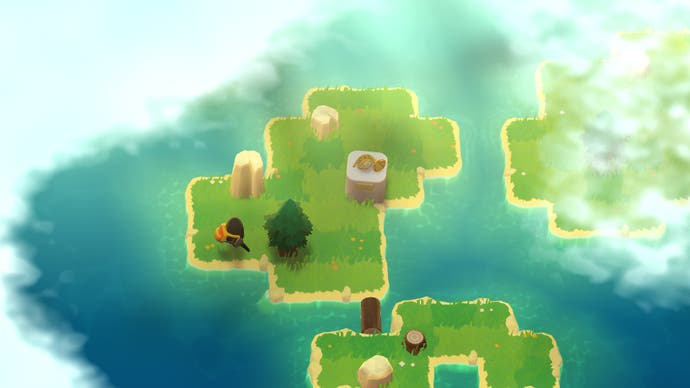
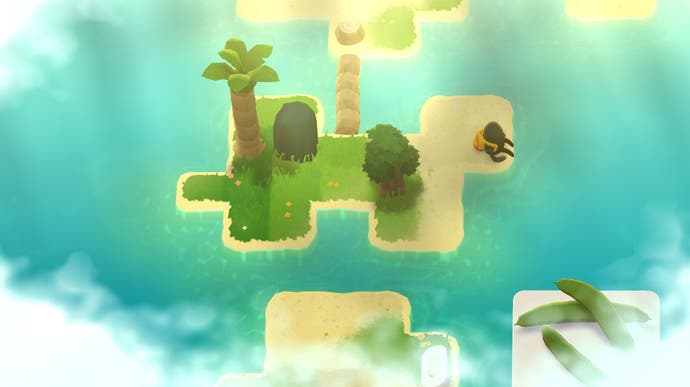
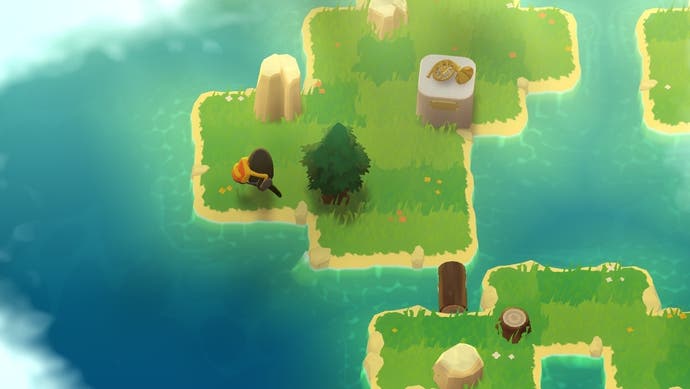
And that sense of separation again. Like Assassin's Creed, Wind Waker's islands brought new life to the game while revealing a truth about the way all games need to create spaces and in-betweenness areas if they're going to build in an actual sense of place. Both games also highlight the pleasures islands offer in their potential for sequence breaking, for hitting islands in the wrong order and not understanding what you're finding because you weren't really meant to find it yet.
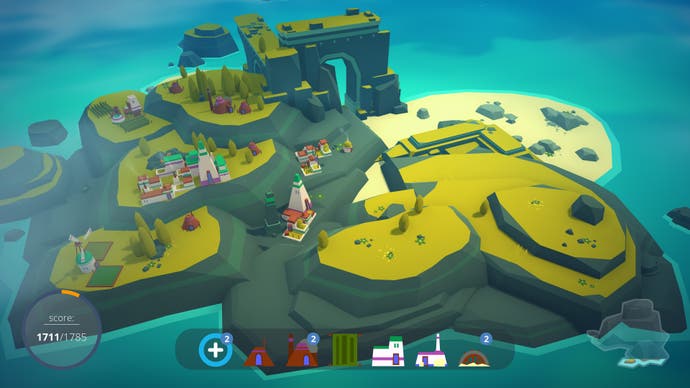
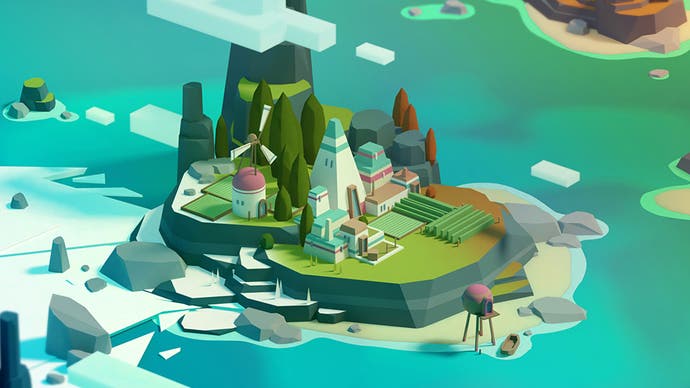
This can be great, actually. I remember wading ashore in Wind Waker and finding an island graced with a single cabana. Purpose and intent seemed visible everywhere, but what purpose, what intent? In truth, it just wasn't this island's time yet, but I'm still glad I found it at that useless moment. I got to enjoy the game sneezing unexpectedly, letting players have access to something before they're ready for it. It also feels so authentic when this happens, so unexpectedly close to real life, where not every monument has immediate meaning or purpose, where things are sometimes thrillingly just there.
To be there and then not there. This is islands, too. In Islanders, a tactical city-builder I particularly love, your job is to fill up an island with human life, with towers and squares and fountains. And then once it's done your reward is that you have to move on - outwards, onwards, to another bigger island space where the whole thing repeats. And you do this knowing that you can never return. It's a wrench.
Finally, whenever I think of islands I always think of From Dust, Eric Chahi's haunted thermodynamics fish tank. In a later level - the best level - your floating god begins things with a tiny piece of rock loose in a giant ocean. You can coax lava from the rock and then use it to paint in an entire island chain so your believers can get from one part of the map to another. Finally, games have reached a perspective where you aren't just exploring islands but dabbing them into being with a celestial brush.
"Paradise is an island. So is hell." I discovered that line in Judith Schalansky's beautiful, far-roving book, An Atlas of Remote Islands: Fifty Islands I have not visited and never will." Her book is a reminder of the sheer potential of islands, real and imagined - or both real and imagined, in her case. Islands can be beautiful and poisoned, lonely, bustling and deserted, welcoming and (often rightfully, as history teaches) wary of newcomers. Islands can be fought over, stolen, or simply compromised by the wearing tread of tourists like me. Islands can be misunderstood, misrepresented, or reduced to wrong-headed platitudes or unfairly asked to stand for a single idea, or a single aspect of what they truly are.
Islands are many things. But when I think of islands, digital or otherwise, there is often that golden moment: the arrival, and the hope for arrivals still to come. The island appears on the horizon and then you're in the surf, on the sand, off to somewhere new, or somewhere old and familiar and much missed, much needed. "The day of landing" is the phrase that settles in the head. It's the ancient Egyptians' sonorous term for the moment of death, but because I first encountered it in a book on Homer, it's always linked to arrival on an island in my mind. The spray of the sea gives way but never relents entirely. Even with a footing on sturdy rock, you can still hear that same sea booming and rushing in the background, shaking the heart as it goes.
